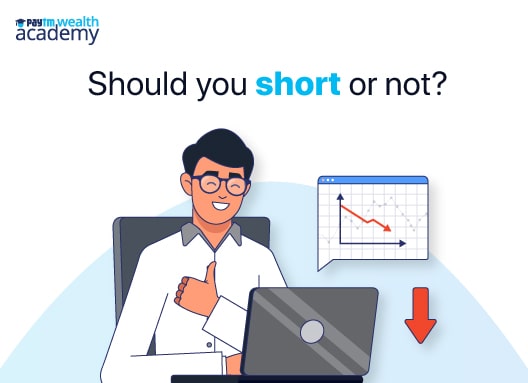Should you Short or not?4 min read
If you know even a little about the stock market, chances are that you have heard about short selling, or simply, shorting. Even to this day, the reason why a significant number of people who are investing and trading in the stock market, are yet to make their first short trade, is simple – the way how the concept of profit and loss in the stock market is perceived.
Common knowledge is that anything that gains value is profitable and the one that loses value brings loss, which is true unless we’re talking from the perspective of the stock market.
In the stock market, the value of securities can either go up or down. Now if you believe the price of a security is going to go up, you can buy it today and sell it at a higher price later. This kind of trade is called a long trade.
But what if you are expecting the price of a security to go down? What do you do? Do you just sit back and wait till the market is favorable for a long position again? Well, if you are a long term investor, that would certainly be the right thing to do. But if you are a trader, maybe you can short.
What is Shorting?

Shorting (also called short selling) is when you speculate over the falling price of a security. For a trader taking a short position, the goal is to borrow the stocks from the broker, sell at a certain price, buy them back at a lower price and return the stocks to the broker. The difference between the sell and buyback price is the profit the short seller gets to pocket. Since shorting involves borrowing the stocks that you don’t own, the investor needs to maintain a margin with the exchange. This margin, which is like a collateral, is required to be maintained to compensate for the loss, in case the price moves up.
An example of Shorting
A trader reckons that a certain stock ABC, which is currently at Rs 1,000, is overvalued and therefore, its price will fall. So, the trader borrows and sells 10 units of this stock at the current price of Rs 1,000 per stock. Later, when the price of the stocks falls to, say, Rs 860, the trader buys the 10 units back at Rs 860 and returns it to the broker. So, the net profit earned by the trader is Rs 140*10 = Rs 1,400.
Why you should Short

According to Elliott Wave Theory, the market of any security moves in the form of corrective waves and progressive waves. A progressive wave is the one that drives the market in the direction of the larger trend. On the other hand, a corrective wave opposes the larger trend. In other words, irrespective of the prevailing trend, both long and short opportunities are always present, almost in a 1:1 ratio. So if you are not shorting, you are turning a blind eye to almost 50% of the opportunities in the stock market. That’s a lot, isn’t it?
Why you shouldn’t Short
It’s true that short positions are riskier than long positions. How come? Well, if the market starts moving up instead of down, your loss, theoretically, can be unlimited because there’s no limit to how far a stock’s price can climb. Practically, there’s no such thing as unlimited realized loss. For context, realized profit or loss is the net profit or loss booked by a trader when they square off their position.
Still, sometimes things can go wrong. Like in case of a short squeeze, which is a rapid increase in the price of a stock, which generally happens when there is a large number of open short positions. Quite an infamous instance of short squeeze was in January 2021 when a huge short squeeze in the stocks of GameStop Corp. led to 17x increase in the price causing massive losses to the short sellers. Another one was in mid-2020 in the stocks of Tesla, which was the most shorted stock in the world at that time.
So should you Short or not?

There’s no direct answer to this question because it depends on you, your knowledge of the stock market, and ultimately, your trading plan. But if we really had to answer this, here’s what we think:
- You should short if you are aware of how the risk management in case of short positions differ greatly from that in long positions, especially with the involvement of margin and leverage.
- You should short if you understand how stop loss works and how it can be used to limit your loss in short trades.
- If you want to learn how to hedge your portfolio.
- If you don’t want to miss out on approx. 50% of the opportunities in the stock market.
So yes, it all comes down to what you think and whether you possess the all-round knowledge of shorting before you finally step into this other side of the market.
To learn all about shorting, margins, hedging, investing, and much more, check out Paytm Wealth Academy




